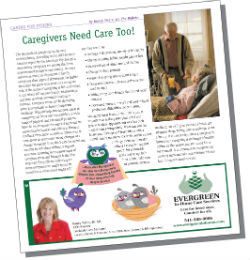By Nancy Webre, BS, MS
 The demands of caregiving can be very overwhelming. According to the 2012 Stress in America report by the American Psychological Association, caregivers are among the three most-stressed groups in our country. Surveys indicate as many as 70 percent of family caregivers show signs of depression, far higher rates than for peers who aren’t in a caregiver role. If the stress of caregiving is left unchecked, it can take a toll on your health, relationships and state of mind, eventually leading to burnout. Caregiver stress can be damaging since it is typically a chronic, long-term challenge. Without help and support, stress of caregiving can leave one vulnerable to a wide range of physical and emotional problems. How do we recognize the signs of burnout? We must often be honest and willing to listen to feedback from those around us. Those who do care about us may notice mood changes or a change in energy. If we don’t care for ourselves, we may be left alone without a support structure. Learning to recognize signs of caregiver stress and burnout is the first step with the problem.
The demands of caregiving can be very overwhelming. According to the 2012 Stress in America report by the American Psychological Association, caregivers are among the three most-stressed groups in our country. Surveys indicate as many as 70 percent of family caregivers show signs of depression, far higher rates than for peers who aren’t in a caregiver role. If the stress of caregiving is left unchecked, it can take a toll on your health, relationships and state of mind, eventually leading to burnout. Caregiver stress can be damaging since it is typically a chronic, long-term challenge. Without help and support, stress of caregiving can leave one vulnerable to a wide range of physical and emotional problems. How do we recognize the signs of burnout? We must often be honest and willing to listen to feedback from those around us. Those who do care about us may notice mood changes or a change in energy. If we don’t care for ourselves, we may be left alone without a support structure. Learning to recognize signs of caregiver stress and burnout is the first step with the problem.
Following are some symptoms we might notice in ourselves or what others might tell/say they see in us:
- Feelings of depression, anxiety or irritability
- Change in eating habits, weight gain or loss
- Increased use of stimulants and alcohol
- Change in sleep patterns
- Sense of on-going and constant fatigue
- Decreased interest in leisure activities you used to enjoy
- Withdrawing from friends, family and social contacts
- Decreased interest in work and work related production, difficulties concentrating
Managing stress levels in your life is just as important as making sure your loved one gets to medical appointments or takes their medications appropriately. What can you do? Share your feelings and frustrations with a friend, family members, therapist, social worker or clergy member. Consider joining a caregiver support group. Set reasonable goals and accept help from others. Take care of yourself: exercise; meditate; eat well; give yourself a break; get adequate sleep. Taking time to recharge is not a luxury, it is a necessity. Once a caregiver is burned out, caregiving is no longer a healthy option for the person you are caring for or for yourself. It is important to recognize the warning signs and take action before it is too late. Caregivers need care too.
As seen in U Magazine: Caregivers Need Care Too!
May 2016

